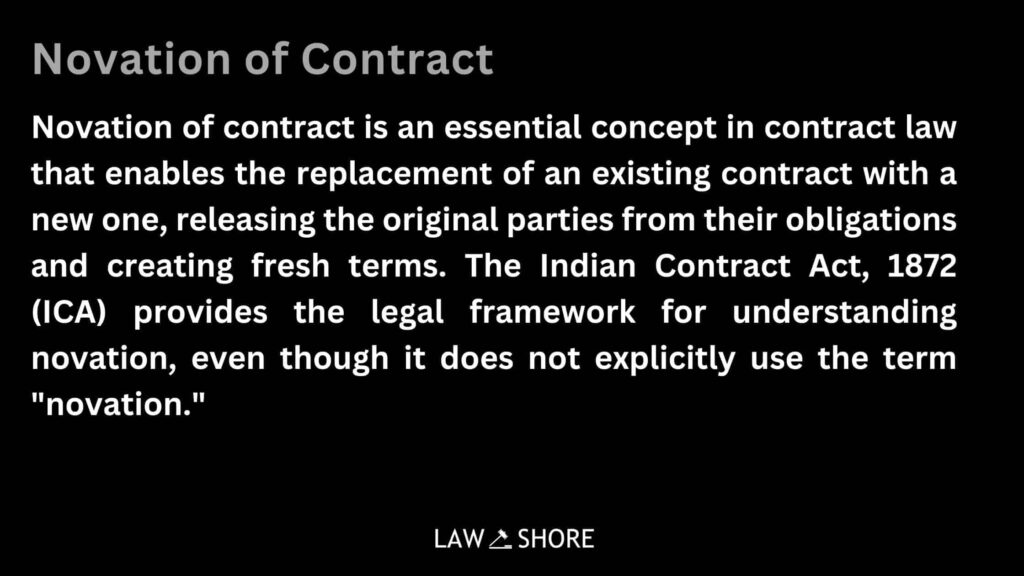Novation of Contract
Table of Contents
ToggleNovation of contract is an essential concept in contract law that enables the replacement of an existing contract with a new one, releasing the original parties from their obligations and creating fresh terms. The Indian Contract Act, 1872 (ICA) provides the legal framework for understanding novation, even though it does not explicitly use the term “novation.” Below, we discuss the relevant provisions under the Act and provide illustrative examples to clarify the concept.

Meaning of Novation of Contract under the Indian Contract Act, 1872
Novation of Contract refers to the process of replacing an existing contract with a new one, which results in the discharge of the original contract and the creation of a new one. Under Section 62 of the Indian Contract Act, 1872, a contract may be altered or substituted by mutual consent, effectively forming a new contract that cancels the previous one.
Example: If Mr. A, a contractor, has a contract with Mr. B to build a house, but later Mr. C agrees to take over the contract, with Mr. B’s consent, a novation occurs. Mr. C replaces Mr. A, and the contract between Mr. A and Mr. B is discharged. The new contract is now between Mr. B and Mr. C.
Relevant Provisions under the Indian Contract Act, 1872
Section 62: Alteration of Contract by Mutual Consent
Section 62 of the Indian Contract Act, 1872, provides the legal foundation for novation. It states that a contract may be altered by mutual consent of the parties involved, leading to the discharge of the original contract and the formation of a new contract. In essence, this provision acknowledges that the original contract can be replaced by a new one, which is the essence of novation.
Section 62 – Alteration of contract by mutual consent:
“If the parties to a contract agree to substitute a new contract for an old one, or to alter the terms of the original contract, the original contract is discharged, and a new contract is formed.”
Although Section 62 doesn’t explicitly mention “novation,” it is the closest legal provision to this concept, as it allows the substitution of a new contract for the old one, thereby terminating the original agreement and forming a new one.
Essential Elements of Section 62 of the Indian Contract Act, 1872
Section 62 of the Indian Contract Act, 1872, deals with the alteration or modification of contracts by mutual consent, which is a key feature in the process of novation of Contract. The section outlines the conditions under which the parties to a contract may alter, revoke, or replace the original contract. The essential elements of Section 62 are:
Consensus ad Idem (Agreement between the Parties)
For a contract to be altered, revoked, or replaced, there must be a mutual agreement, meaning that all parties involved must agree to the proposed change. This agreement ensures that there is a meeting of the minds between the parties and that they understand and accept the new terms or arrangements.
Existence of a Previous Enforceable Contract
There must be an existing enforceable contract between the parties before any changes can be made. The original contract provides the foundation for any subsequent modifications, novation, or terminations. Without a valid, enforceable contract, there is no basis for altering or replacing it.
Replacement, Revocation, or Modification of the Contract
Section 62 allows for three possibilities:
– Revocation of the original contract, meaning the contract is cancelled.
– Replacement of the original contract with a completely new one, possibly involving different terms or parties.
– Modification of specific terms in the contract, while maintaining the original structure of the agreement.
In all cases, the changes must be made by mutual consent of all parties involved.
Termination of the Original Contract
Once a contract is altered, replaced, or modified, the original contract is terminated. This means that the obligations under the original contract are no longer enforceable, and only the new or modified contract governs the relationship between the parties.
More Illustrations to understand the concept of Novation of Contract
Illustration 1: Novation with New Parties
Scenario: A company, XYZ Ltd., enters into a contract with a supplier, ABC Corp., to supply raw materials. After some time, XYZ Ltd. is acquired by another company, DEF Ltd. As part of the acquisition, XYZ Ltd. and ABC Corp. agree to novate the contract, replacing XYZ Ltd. with DEF Ltd. as the new party to the contract.
Outcome: In this case, DEF Ltd. assumes all rights and obligations of XYZ Ltd. under the original contract, and ABC Corp. releases XYZ Ltd. from any further liability. The original contract between XYZ Ltd. and ABC Corp. is extinguished, and a new contract with DEF Ltd. is formed.
Illustration 2: Novation with Modified Terms
Scenario: A contractor, Mr. A, enters into a contract with a client, Mr. B, to construct a building. Midway through the project, the parties agree to modify the original contract’s payment terms, increasing the cost of the project due to additional work. They decide to replace the old contract with a new one that includes these revised terms.
Outcome: Here, the old contract between Mr. A and Mr. B is discharged, and a new contract is formed with modified terms. Both parties agree to the new terms, and the original contract is no longer enforceable.
Kinds of Novation of Contract
Novation, as a concept in contract law, involves replacing an existing contract with a new one. There are different kinds of novation, which can occur based on the nature of the changes involved or the parties involved:
Novation Involving Replacement of Parties:
- In this type of novation, one party to the contract is replaced by another. The new party assumes the obligations and rights of the original party, and the original party is discharged from any further responsibilities under the contract.
- This is common in business contracts where a party may want to transfer their role to another party, with the agreement of all involved parties.
Novation Involving Modification of Terms:
- Here, the parties may agree to alter the terms of the original contract, creating a new agreement. While the core parties remain the same, the terms (such as price, timeline, scope of work, etc.) are modified.
- The modification or alteration of terms leads to the creation of a new contract, and the original contract is discharged.
Novation Involving Complete Substitution:
- This type involves the complete substitution of an old contract with a new one. The new contract may have entirely different terms, parties, or obligations. The old contract is fully extinguished, and a new one governs the relationship between the parties.
Novation vs. Rescission
Although novation and rescission both involve changes to or the ending of a contract, they differ in key aspects:
- Novation:
- Nature: Novation involves the replacement of an old contract with a new one, by mutual agreement. The old contract is extinguished and replaced by a new agreement, and all parties involved must consent to the changes.
- Effect: The original contract is discharged, and a new contract is created. In novation, obligations, rights, and parties may change.
- Parties: Novation can involve a change in the parties involved, where one party is replaced by another.
- Rescission:
- Nature: Rescission involves the cancellation or annulment of the contract. It may occur due to breach of contract, misrepresentation, fraud, or mutual agreement.
- Effect: The contract is simply terminated, and the parties are restored to their original positions. Rescission does not replace the contract with a new one.
- Parties: There is no change in the parties involved; rather, the contract is simply voided.
Aspect | Novation | Rescission |
|---|---|---|
Definition | Novation is the replacement of an existing contract with a new one, extinguishing the original agreement. | Rescission is the cancellation or annulment of a contract, restoring the parties to their original positions. |
Nature | Involves substitution of the original contract by a new contract, which may change terms, parties, or obligations. | Involves the termination or cancellation of the contract, returning the parties to their pre-contract state. |
Effect on the Original Contract | The original contract is discharged, and a new one comes into existence. | The original contract is voided or cancelled, but no new contract is created. |
Change in Parties | Can involve the substitution of one or more parties with others, resulting in a new contractual relationship. | No change in parties; the original contract is simply terminated. |
Mutual Consent | Requires the mutual consent of all parties to create a new contract. | Can be done unilaterally or with mutual consent, but typically involves rescission due to factors like breach, fraud, or misrepresentation. |
Obligations | The obligations of the original parties are transferred or replaced in the new contract. | The parties are relieved from the obligations of the contract, as the contract is cancelled. |
Legal Outcome | A new, enforceable contract replaces the old one. | The contract is no longer enforceable, and the parties are restored to their original positions. |
Use Case | Used when the terms, parties, or obligations need to be altered or when a third party replaces one of the original parties. | Used to cancel a contract due to invalidity, misrepresentation, or breach. |
Example | Changing the parties in a contract for the sale of goods. | Cancelling a contract due to fraud or breach by one party. |
Key Differences in Summary:
- Novation of Contract creates a new contract that replaces the old one and may involve changes in terms or parties, whereas rescission simply cancels the contract without creating a new one.
- Novation of Contract requires mutual agreement and may involve a third party, while rescission can happen due to breach, fraud, or mutual agreement but doesn’t necessarily involve creating a new agreement.
Novation vs Alteration
Aspect | Novation | Alteration |
|---|---|---|
Definition | Novation is the replacement of an existing contract with a new one, which extinguishes the old contract and creates a new one. | Alteration involves modifying or changing the terms of an existing contract without replacing it. The contract remains in force with modified terms. |
Effect on the Original Contract | The original contract is completely discharged, and a new contract comes into existence. | The original contract continues to exist, but certain terms of the contract are changed. |
Change in Parties | Novation can involve a change in parties, where one party is replaced by another, and the new party assumes the obligations of the original party. | No change in the parties of the contract. Only the terms or conditions of the contract are modified. |
Creation of a New Contract | A new contract is created, which replaces the old one. | No new contract is created. The original contract remains in force with altered terms. |
Consent of Parties | Requires the consent of all parties involved, including the new party (if any). | Requires the consent of the parties involved but does not require a new party to be involved. |
Modification Scope | Novation typically involves substituting terms, parties, and obligations, creating a new legal relationship between the parties. | Alteration typically involves modifying specific terms of the contract, such as price, delivery dates, or other provisions, but not the overall framework of the contract. |
Effect on Rights and Obligations | The rights and obligations of the original parties are transferred or replaced in the new contract. The old rights and obligations no longer exist. | The rights and obligations of the parties are retained, but specific terms are changed. The original agreement still governs. |
Legal Outcome | The old contract is terminated, and a new enforceable contract is created. | The original contract is amended and remains in force, with only the modified terms being legally enforceable. |
Use Case | Used when a contract is being replaced entirely, often when one party is substituted for another or the terms of the contract are substantially changed. | Used when the terms of the contract need to be changed or adjusted without replacing the entire contract. |
Key Differences in Summary:
- Novation of Contract results in a new contract, replacing the original one, which may involve changes in terms or parties, whereas Alteration only modifies specific terms of the original contract, leaving the rest of the agreement intact.
- Novation of Contract involves a complete discharge of the original contract, whereas Alteration keeps the original contract in force, but changes certain conditions or terms.
Important Case Laws of Novation under the Indian Contract Act, 1872
Guruswamy v. Venkataraman (1927)
This case is significant because it dealt with the replacement of a party in a contract. The court held that for novation of Contract to take place, the consent of all parties involved is essential. In this case, the replacement of a party was treated as a novation, which extinguished the old contract and created a new one with the substituted party.
K. K. Verma v. Union of India (1954)
This case emphasized the alteration of contract terms through novation. The court ruled that for novation to be valid, there must be mutual consent and clear agreement on the new terms. It highlighted that a modification in terms, such as changing the scope of work or payment structure, could lead to a novation that terminates the original agreement.
N. R. Narayana v. United India Insurance Co. Ltd. (2008)
In this case, the court recognized novation as a process where one contract is replaced by another, and all prior obligations are extinguished. It reinforced the principle that the original contract must be terminated and replaced with a new agreement that all parties consent to.
Union of India v. Raman Iron Foundry (1974)
This case dealt with the issue of whether a contract could be considered novated when there was a change in the terms of the contract. The court held that the consent of all parties is crucial to novation. If one party unilaterally changes the contract without agreement from the others, it does not constitute a novation but rather a breach of contract.
Raghunath v. Satish Chandra (1952)
This case affirmed that novation involves mutual consent to replace the existing contract with a new one. The court observed that the original contract was effectively extinguished, and a new relationship was formed with the newly substituted party. The case underlined the importance of agreement from all parties for a contract to be novated.
How does Novation of Contract affect the rights and obligations of the parties?
1. Discharge of Original Contract
When novation of Contract takes place, the original contract is discharged. This means that the parties are no longer bound by the terms and obligations of the original agreement. The old rights and duties cease to exist once the new contract is formed.
2. Creation of New Rights and Obligations
A new contract comes into existence after novation of Contract, and it may have different terms, obligations, or parties. The new contract outlines the rights and obligations of the parties in place of the old contract.
3. Transfer of Rights and Liabilities (Substitution of Parties)
If novation involves the substitution of a party, the new party assumes the rights and obligations of the original party. The original party is discharged from all responsibilities under the contract, and the new party takes over the contract as if they were the original party.
For example, in a business contract, if one party (Party A) transfers its obligations to a third party (Party C), Party C will assume Party A’s responsibilities under the contract, and Party A is released from those obligations.
4. Effect on Enforceability
Once novation occurs, the new contract becomes enforceable. This means the parties to the new contract must fulfil the terms agreed upon in the new agreement. The rights and obligations in the new contract are legally binding, replacing the rights and obligations under the original contract.
5. Impact on Non-Substituted Parties
If the novation involves only the modification of terms or one of the parties, the other party (if unchanged) remains bound by the new terms of the contract. For example, if Party B consents to a new agreement where Party A is replaced by Party C, Party B will still be required to fulfil its obligations under the new contract, but now to Party C instead of Party A.
Can Novation of Contract involve the substitution of one party for another?
Yes, Novation can involve the substitution of one party for another. This is one of the key features of novation and distinguishes it from other contract modifications like alteration. When novation involves the substitution of a party, the new party assumes the rights and obligations of the original party, and the original party is released from any further responsibilities under the contract.
How does substitution work in Novation of Contract?
Replacement of the Original Party: In a novation, if one party is substituted, the original party is discharged from all its obligations, and a new party takes its place. The new party steps into the shoes of the original party and assumes all rights, duties, and liabilities under the contract.
Mutual Consent: For novation to be valid, all the parties involved in the contract must give their mutual consent to the substitution. This means the original party, the new party, and the other existing party (or parties) must agree to the change.
Discharge of the Original Party: Once novation occurs, the original party is discharged from any further obligations. The new party, in turn, becomes bound by the contract as if they were the original party from the start.
Effect on the Contract: The contract, after novation, continues to be legally binding but with the new party in place of the original one. The new party takes over the obligations, and the contract’s terms continue, but now they govern the relationship between the remaining parties and the substituted party.
Example of Substitution in Novation:
Suppose Party A enters into a contract with Party B for the sale of goods. Later, Party A decides to transfer its rights and obligations under the contract to Party C. Party B agrees to this change, and a novation takes place. Now, Party C takes over Party A’s obligations under the contract, and Party A is no longer responsible for the contract. The relationship between Party B and Party C is now governed by the same contract, but Party C has replaced Party A.
Conclusion
Novation of Contract under the Indian Contract Act, 1872, is an important concept that allows the replacement of an existing contract with a new one, either by altering its terms or substituting the parties involved. Section 62 provides the legal framework for novation by allowing the mutual alteration of contracts, which discharges the original contract and creates a new one. Novation can be applied in various situations, such as corporate restructuring, debt settlements, and substitution of parties. Understanding novation helps businesses and individuals manage their contractual obligations and navigate the complexities of contractual relationships effectively.
Also, Check Out Other Topics in Contract Law:
Explore Law Shore: law notes today and take the first step toward mastering the fundamentals of law with ease.

After Completing my LLB hons, I started writing content about legal concepts and case laws while practicing. I finally started Law Shore in 2024 with an aim to help other students and lawyers.



